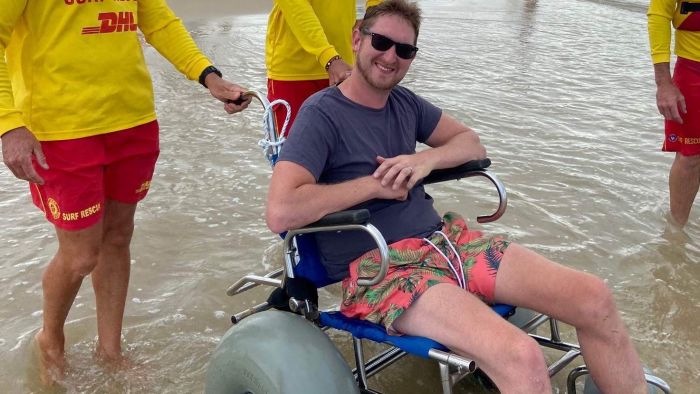The biggest dream for Joshua Marshall is to watch his young children play sport.
Key points:
- Multiple sclerosis derailed Joshua’s dream of being a nurse, but now he’s pursuing a new one
- He has founded a new disability charity, which aims to improve access to venues
- One third of people with a disability avoid situations because of their disability
The 37-year-old dreamed of becoming a registered nurse as a teenager, but a diagnosis of multiple sclerosis four years ago derailed his career path.
“I’ve got two young kids, one of which is a six-year-old boy who loves to play soccer. I cannot get courtside to watch him actually play,” Mr Marshall said.
“I have to stay at the top of the hill to watch him. I want to be part of my son’s soccer game.”
Multiple sclerosis (MS) is a condition of the central nervous system, interfering with nerve impulses within the brain, spinal cord and optic nerves.
Joshua now uses a wheelchair full time and said he has come to a new-found understanding of disability.
“I thought I understood what it meant to have a disability until I found myself in a wheelchair,” Joshua said.
Joshua is the founder of a new disability charity, Inclusion Access, dedicated to improving the accessibility and inclusive practices of venues in Toowoomba and South-East Queensland.
‘Good access means good business’
Inclusion Access is insured and up and running, with the help of board director, Kim Stokes.
“We are here so that one day there will be a situation where, as a dad, you would always be able to get onto that soccer field and that generation would never know any different than ‘My dad came to watch my game every Saturday’,” Ms Stokes said.
While the cost of access is a barrier, Ms Stokes believed it made business sense for venues to make the change.
“With one-fifth of our population having a disability and requiring better access and people who use other walking frames or other walking devices, for instance, better access is needed,” she said.
‘Life is so much richer’
Today is International Day of People with a Disability, an event that aims to increase public awareness, understanding and acceptance of people with disability and celebrate their achievements and contributions.
According to the Australian Bureau of Statistics (ABS), 4.4 million Australians had a disability, or 17.7 per cent of the population, in 2018.
The likelihood of a person having a disability increased with age, with one in two Australians over the age of 65 having a disability.
ABS data also showed that participation in social activities away from home decreased with age, while one-third of people with a disability avoided situations because of their disability.
Joshua is now focused on expanding Disability Access and reaching as many people who need help as possible.
“When I left work as a registered nurse after doing that job for a long time I thought ‘What am I going do with my life? What has life dealt me?'” he said.
“But life is so much richer because you are really helping the situation, helping society, you’re helping enable people to live a better life and that makes my life so much richer.”







